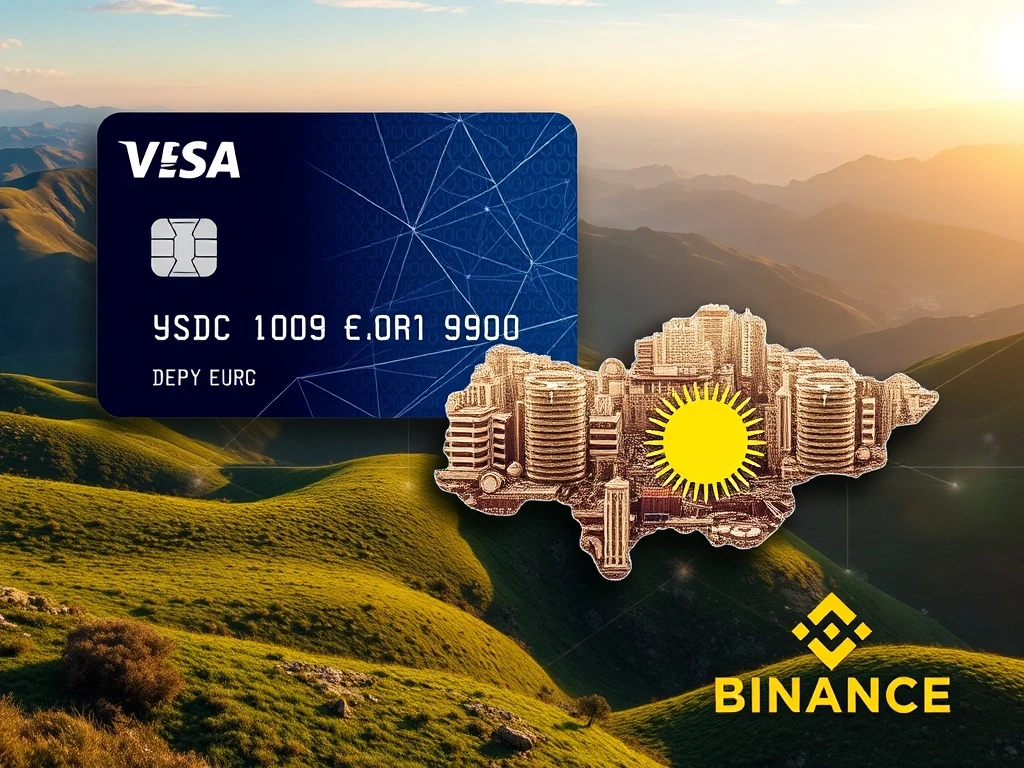Crypto News Today: Unveiling Three Crucial Global Digital Asset Adoption Moves

Stay ahead in the fast-paced world of digital assets. Our latest **crypto news today** summary brings you the most impactful developments. This rapidly evolving landscape sees significant progress daily. Consequently, understanding these shifts is crucial for investors and enthusiasts alike. Today’s highlights include major advancements from Visa, a landmark regulatory clarification from the SEC, and a pioneering national move by Kazakhstan. These events collectively underscore the accelerating trend of global **digital asset adoption**.
Visa Stablecoin Payments: Revolutionizing Cross-Border Transfers
Visa, a global leader in payment technology, has launched a groundbreaking pilot program. This initiative uses stablecoins to streamline cross-border payments. Specifically, Visa Direct now enables banks and financial institutions to pre-fund international payouts. They utilize Circle’s USDC (USDC) and EURC (EURC) stablecoins. This significant step was announced at SIBOS 2025. Chris Newkirk, president of commercial and money movement solutions at Visa, highlighted the pilot’s goal. He stated that cross-border payments have long suffered from outdated systems. Therefore, this innovation aims to reduce the need for capital to be parked in advance. It also modernizes treasury operations for participants.
How Visa Direct Leverages Stablecoins for Efficiency
The pilot program offers a compelling solution for liquidity optimization. Instead of tying up traditional fiat currencies across numerous corridors, institutions can fund Visa Direct with stablecoins. Visa treats these digital assets as cash equivalents. This facilitates near-instant payouts globally. Ultimately, this approach promises to enhance efficiency and reduce costs. The stablecoin market cap currently exceeds $307 billion, reflecting its growing significance. This robust market provides a reliable foundation for such initiatives. Visa’s integration of stablecoins lays the groundwork for money to move instantly across the world. Furthermore, it gives businesses more choice in how they pay. This strategic move by Visa signals a strong commitment to **digital asset adoption** in mainstream finance.
SEC DePIN Tokens: A Landmark Regulatory Clarity
In a rare and significant move, the U.S. Securities and Exchange Commission (SEC) issued a no-action letter on Monday. This letter signals that the SEC will not pursue enforcement action against tokens associated with Decentralized Physical Infrastructure Networks (DePIN). Specifically, the letter addressed a planned token launch by DePIN project DoubleZero. Michael Seaman, chief counsel of the SEC’s Division of Corporation Finance, confirmed this decision. He found that the DoubleZero token and its associated service do not fall under existing securities laws. This decision offers crucial clarity for a burgeoning sector within the crypto space. It helps define the boundaries of **SEC crypto regulation**.
Understanding the DePIN No-Action Letter’s Impact
SEC Commissioner Hester Peirce provided valuable context for this decision. She explained that DePIN fundamentally differs from traditional capital-raising transactions. Congress charged the SEC with regulating securities markets, not all economic activity. Therefore, this distinction is vital. DoubleZero co-founder Austin Federa praised the SEC’s move. He called it more than a milestone for DoubleZero. Federa sees it as proof that US founders and innovators can collaborate with regulators. This collaboration helps achieve clarity while maintaining speed in innovation. This landmark decision allows crypto infrastructure providers to focus on building. They can avoid getting bogged down in the nuances of securities laws. Ultimately, this promotes innovation in the **DePIN tokens** sector, fostering a more predictable regulatory environment.
Kazakhstan Crypto Fund: Paving the Way for Digital Asset Adoption
Kazakhstan has taken a bold step into the digital asset space. The nation established its first state-backed crypto reserve in partnership with Binance. This initiative marks a significant milestone for the Central Asian country. The initial digital asset in the fund’s portfolio is BNB (BNB). BNB is the utility token that powers transactions, fees, and governance on Binance’s blockchain. This announcement came via the Kazakhstan government’s website on Monday. While the exact amount of BNB purchased was not specified, the intent is clear. Kazakhstan aims to build strategic reserves and make long-term investments in digital assets. This move positions Kazakhstan as a forward-thinking nation in the global crypto landscape.
Binance Partnership and Future Implications for Kazakhstan
The fund, named Alem Crypto Fund, operates under the Astana International Financial Centre (AIFC). It was created by the Ministry of Artificial Intelligence and Digital Development and managed by Qazaqstan Venture Group. Binance has maintained a close partnership with the Kazakhstan government since 2022. During that time, former CEO Changpeng “CZ” Zhao signed a memorandum of understanding. This agreement aimed to help develop the country’s crypto regulatory framework. This new fund further solidifies their collaboration. Moreover, this news follows closely after Kazakhstan rolled out its own tenge-backed stablecoin, KZTE. The KZTE stablecoin launched on the Solana network through a partnership with Mastercard, Intebix, and Eurasian Bank. These combined efforts demonstrate Kazakhstan’s strategic commitment to **digital asset adoption** and blockchain innovation.
The Broader Impact on Digital Asset Adoption and Future Trends
The events highlighted in today’s **crypto news today** paint a clear picture. Global **digital asset adoption** is accelerating across various sectors. Visa’s pilot demonstrates how stablecoins can modernize traditional financial systems. This directly impacts cross-border payments, making them faster and more efficient. Similarly, the SEC’s clarity on **DePIN tokens** provides a much-needed boost for innovation. It reassures developers and investors in this niche. Furthermore, Kazakhstan’s state-backed **Kazakhstan crypto fund** signals increasing governmental confidence in digital assets. This national endorsement could inspire other countries to explore similar strategies.
Collectively, these developments indicate a maturing market. They show a growing acceptance of cryptocurrencies and blockchain technology. Institutions and governments are increasingly recognizing the practical benefits. These include enhanced efficiency, reduced costs, and improved accessibility. As a result, the integration of digital assets into everyday finance continues to expand. The ongoing evolution promises further innovation and broader participation. Therefore, staying informed on these crucial trends remains essential for navigating the future of finance.








